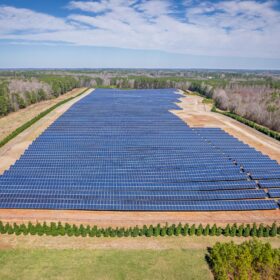Following the commissioning of a 50 MW solar project in Virginia, Engie North America announced that it has officially completed the 2.3 GW portfolio of wind and utility-scale solar projects that the company jointly owns alongside Hannon Armstrong Sustainable Infrastructure Capital.
The entire portfolio is comprised of 13 renewable projects in 15 counties spanning 5 states, including 1.8 GW of onshore wind and 0.5 GW of utility-scale solar projects. The portfolio is estimated to be producing enough renewable energy on the grid to provide power to the equivalent of over 500,000 homes in the U.S., and each project was constructed between the end of 2019 and the second half of 2021.
Each of the 13 projects has off-take agreements with customers, and their capacity represents a significant portion of Engie’s roughly 3 GW of renewable generation in the U.S. today. The company does also have a pipeline of 10 GW of renewable projects on the horizon.
The two companies targeted what they deemed to be key markets in the United States for the portfolio, including the Electric Reliability Council of Texas, Midcontinent Independent System Operator, the Southwest Power Pool (SPP) and PJM Interconnection (PJM).
The projects were financed using $2 billion in tax equity commitments, including $1.6 billion in tax equity that Engie was able to secure in April 2020.
Hannon Armstrong’s entrance into the portfolio was announced in July 2020, when the company took an immediate ownership of 49% of the 663 MW of wind projects that were already commissioned. The remaining 1.6 GW of projects were transferred into the partnership upon commissioning.
This content is protected by copyright and may not be reused. If you want to cooperate with us and would like to reuse some of our content, please contact: editors@pv-magazine.com.









By submitting this form you agree to pv magazine using your data for the purposes of publishing your comment.
Your personal data will only be disclosed or otherwise transmitted to third parties for the purposes of spam filtering or if this is necessary for technical maintenance of the website. Any other transfer to third parties will not take place unless this is justified on the basis of applicable data protection regulations or if pv magazine is legally obliged to do so.
You may revoke this consent at any time with effect for the future, in which case your personal data will be deleted immediately. Otherwise, your data will be deleted if pv magazine has processed your request or the purpose of data storage is fulfilled.
Further information on data privacy can be found in our Data Protection Policy.